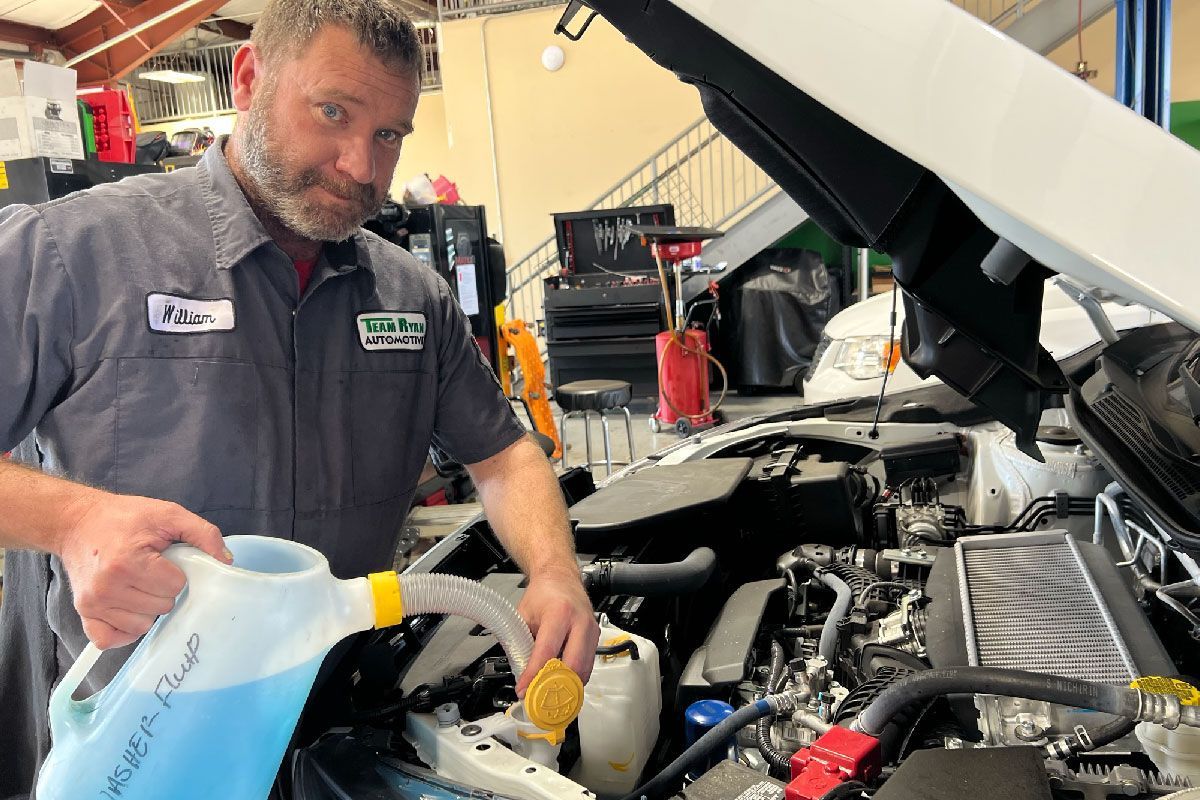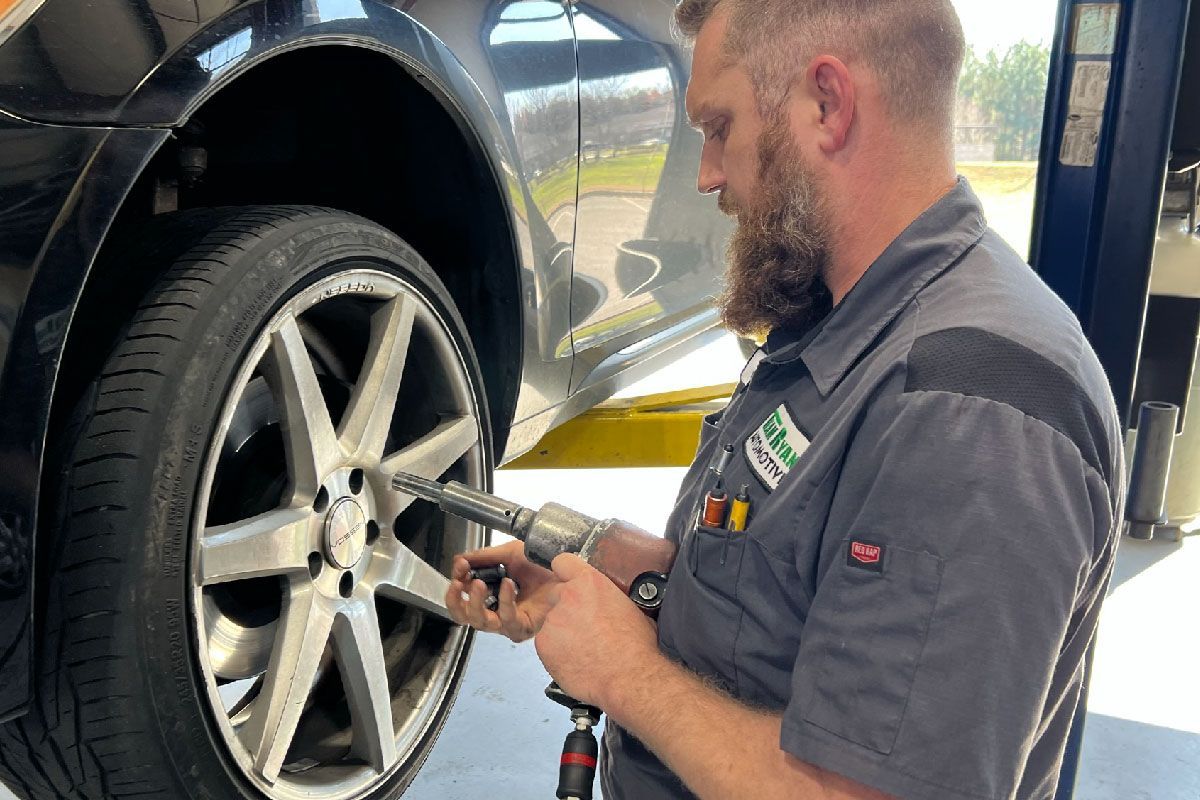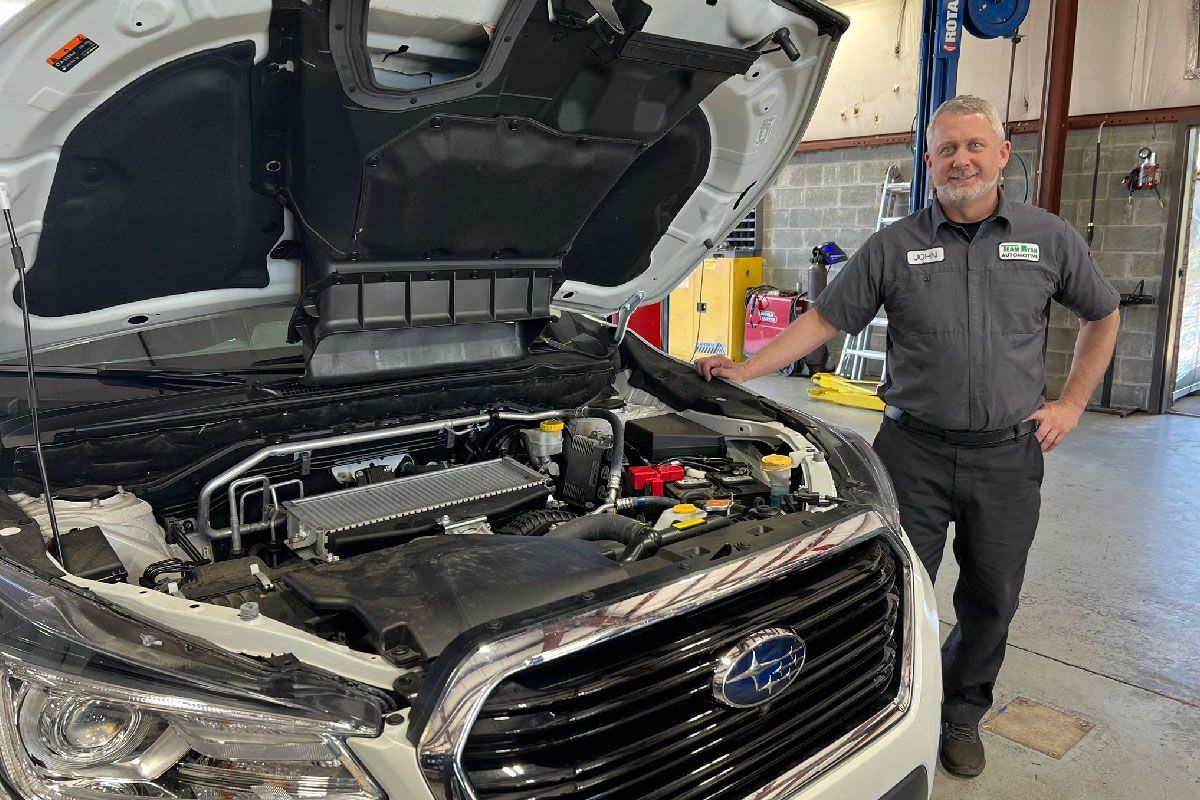Transmission Services Centers in Buford and Cumming, GA
How The Transmission Works
The purpose of the transmission is to turn power into what is called torque. The transmission is what changes the gear of an engine. It transfers the power of the engine to the wheels in order to move the vehicle forward.
What is a transmission? It’s an intricate component of gears and sensors that acts as a bridge between your engine and your wheels. The transmission ensures that the energy provided by the engine travels smoothly to the tires, providing better, safer control for the driver.
This activity generates a lot of heat, though. Transmission fluid keeps your transmission from getting too hot and sustaining damage. As this fluid is used over time, it becomes less efficient, leaving your transmission more vulnerable to heat damage.
The transmission assembly is the connection between the engine and the axles or driveshaft of your vehicle. Whether you drive a manual, automatic, or semi-automatic vehicle, the transmission plays a crucial role in the performance and reliability of your vehicle. The transmission keeps engine output matched with speed and load conditions. Because engines operate at high rotational speeds, the transmission reduces engine output speed and transmits torque through the differential, driveshaft, and wheels. As engine speed varies, the transmission switches between the gears that influence the amount of torque applied to the wheels. Transmission fluid performs a variety of duties, depending on the type of transmission. Transmission fluid acts as a cooling agent and protects the transmission by lubricating the internal gears and preventing corrosion and rust. In a manual transmission, clutches and gear shifts provide pressure and force—like engagement and disengagement—while in an automatic transmission, transmission fluid provides these same operational functions of force and pressure.
There are four types of transmissions:
- Automatic Transmission
- Manual Transmission
- Automated Manual Transmission
- Continuously Variable Transmission
Jump To: More Details
What Our Customers Are Saying
"Very happy with Team Ryan! The transmission just started slipping and I didn't feel safe driving. We needed to have the company truck back on the road asap. The work was initiated immediately and completed in one day and done with care and professionalism! Thank you for your help and allowing us to be back in business without skipping a beat. Excellent service...Go TEAM!!"
- Viet N.
What Is A Transmission Service?
A transmission service is simply the removal of the transmission fluid via a drain plug and then adding new transmission fluid. This process gives the transmission a sort of “cleanse” that helps reduce the strain on the components within the transmission and prolong its life.
Why Does Your Car Need A Transmission Service?
A transmission service is essential due to the fact that by removing the old transmission fluid, any buildup that has occurred in the transmission will be removed also. The old residue inside of your transmission can potentially contaminate your fluid over time and put unnecessary stress on the transmission, thus increasing your chances of having to replace the transmission all together.
The transmission is one of the most crucial components for ensuring the smooth and efficient operation of your vehicle. Without proper maintenance, its operation can be hindered, with noticeable effects on the quality of your ride. Transmission problems usually cause violent grinding noises, gear slipping, hard shifting, and other serious interruptions to your driving.
A transmission concern can negatively affect your vehicle’s drivability and performance. Symptoms of an impending transmission service include grinding gears, difficulty shifting, slipping out of gear, bucking, and hesitation. Even if your transmission is in neutral, excessive noise is a sign of transmission problems. In a manual transmission, a dragging clutch, or a clutch failing to disengage from the flywheel, is another sign of transmission issues. When this occurs, the clutch continues to spin with your vehicle’s engine, and a grinding noise will occur. A burning smell sifting through the air vents is a sign of burning transmission fluid and an overheating transmission. Things that can negatively impact the life of your transmission include extreme driving habits, and excessive loads or heavy towing habits. Because of the necessary pressure and force provided by transmission fluid in automatic transmissions, old, dirty, and unchanged transmission fluid can cause performance issues. Regular transmission maintenance as indicated by your vehicle’s manufacturer can help prevent transmission problems, but if you experience any of the above warning signs of transmission trouble, contact us today about transmission repair.
What Causes A Transmission Problem
It is important to follow manufacturer’s guidelines when to change filters and fluids in the transmission. Transmission fluid leaks will also cause problems with the transmission.
As transmissions have become computerized through the years, a computer or sensor malfunction can cause issues with your transmission.
How To Know If Your Transmission Needs Maintenance
It is important to be aware when something is wrong with your transmission. Here are some signs that all is not right with your transmission:
- Not switching gears
- Burning smell
- Slipping gears
- Grinding or shaking
- Check Engine Light is on
- Humming sounds
Our Transmission Repair Includes
The transmission is a vital component to your vehicle. Our ASE-certified technicians can perform a thorough transmission fluid service and ensure that your transmission will continue to run safely and efficiently.
Our transmission experts recommend getting an automatic transmission fluid exchange every 50,000 miles. Typically, factory recommended service can be a little bit more than that, but it doesn’t account for harsh driving and weather conditions drivers’ face on a daily basis. Once you’ve hit 50,000 miles, have Team Ryan Automotive perform a complete fluid flush.
With proper care up to 100,000 miles, both a filter and fluid service will likely be recommended at that time. We will consider previous service history along with current fluid level and condition when recommending services. Once you’ve hit 100,000 miles, have Team Ryan Automotive perform an evaluation of the fluid condition that will allow us to make the best recommendations for you and your transmission.
The best way to prevent costly transmission repairs is to keep your transmission fluid fresh. When talking about the importance of fluid condition and regular service intervals, your transmission is no different than your engine. The fluid needs periodic changing and service. At Team Ryan Automotive, we can remove your old transmission fluid, perform a complete fluid service or flush of your transmission system, and install new, premium-quality fluid. We use state-of-the-art technology to monitor this process—and we even see the old, muddied transmission fluid extracted from your car.
Another option is to replace the filter. However, not all transmissions are equipped with a serviceable filter. We will perform the necessary research along with going over your previous service history and future plans for your vehicle to help make the best recommendations for you and your transmission.
Use The Correct Transmission Fluid
Use The Correct Transmission Fluid
Although it might seem obvious, many people don’t know it’s essential to use the automatic transmission fluid recommended by your vehicle’s manufacturer. This is because different fluids contain different additive packages that function specifically for certain transmissions. Only the correct fluid type will ensure your transmission performs correctly. Only in the event that you’ve had the original transmission changed should you use the recommended fluid for that particular transmission.
Aside From Using The Right Fluid And Regular Care, Here Are A Few Driving Habits That Can Help Your Transmission
- Don’t shift when your car is moving. You’ll most likely hear a grinding noise if you do.
- Don’t ride the brake. Continuously pressing the brake pedal as you drive makes work much harder for your transmission.
- Let your engine warm up. If the temperature dips in the winter, allow your vehicle a few minutes to run before putting it gear. This gives the transmission fluid time to warm up, so it can better lubricate the moving parts.
Recap: A simple transmission service not only will make your transmission run better but will also prolong the life of the transmission. In other words, you will be saving serious money by maintaining the transmission as transmission repair/replacement averages as one of the highest costs related to automobiles.
Transmission Repair FAQ
As you drive, the transmission helps you shift gears. Most vehicles on the road today use an automatic transmission. You won’t get anywhere in a hurry if your transmission isn’t functioning properly. We’re here to answer some of the commonly asked questions about automatic transmissions.
What Are Common Transmission Problems?
Here are some common transmission problems:
• Low or dirty transmission fluid caused by leaking
• Worn gear synchronizer
• Worn clutch (manual transmissions)
• Failed needle roller bearings (automatic transmissions)
What Are Early Signs Of Transmission Problems?
Here are some warning signs that something may be off with your transmission:
• Refusal to switch gears
• Burning smell
• Slipping gears
• Grinding or shaking
• Check Engine Light is on
• Humming sounds
Do Transmission Problems Cause The Check Engine Light To Come On?
Transmission problems can cause the Check Engine Light to come on. Due to the problem of the transmission, the indicator light can illuminate.
How Do You Know If Your Car Needs Transmission Fluid?
If your transmission is low of fluid, there are a few ways you can tell:
• Drips of puddles underneath the car
• Trouble shifting through gears
• Sudden jerks
• Burning smell
• Transmission won’t engage
What Factors Determine The Price Of Transmission Repair?
Many different factors go into determining costs of transmission repair. The major factor is what type of vehicle you drive. The year, make and model of the car, determine how much parts and labor will cost. Another factor is how much damage the transmission has sustained. Your transmission should last a minimum of 100,000 miles by servicing your transmission on a regular basis.
What Does A Traditional Automatic Transmission Service Include?
Fluid is first drained from the pan during an automatic transmission service. A new transmission filter is installed with a new pan gasket once the pan has been removed. Finally, fresh automatic transmission fluid (ATF) is used to refill the vehicle.
Is There A Difference Between A Transmission Fluid Change And Flush?
During a transmission fluid and filter change, it’s only the fluid in the pan that is drained and replaced with new ATF. Four to five quarts of fluid will typically be replaced in this process, while nine to sixteen quarts are replaced during a full transmission fluid flush. The difference in amounts is because the complete flush drains and replaces the fluid in the entire system.
How Can I Extend The Life Of My Transmission?
If you don’t do any maintenance on your transmission, it can fail in much less than 100,000 miles. However, with regular care and maintenance the lifespan of your transmission can be vastly improved and help you keep repair costs to a minimum. Regularly performed maintenance and fluid services are always more affordable than mechanical failures and repairs. The team at Team Ryan Automotive is here to share two easy ways to take care of your transmission.
Automatic Transmission Repair
A transmission is responsible for transferring power from the engine to the drive wheels and helping the engine accommodate a range of speeds.
Clutch Adjustment And Inspection
In a manual transmission, the responsibility of the clutch is to engage and disengage the transmission from the engine.
Clutch Replacement
In a running vehicle, the engine is always turning. The transmission connects to the engine and supplies power to the wheels.
Manual Transmission Repair
Manual transmissions allow drivers to shift between gears manually while simultaneously regulating power and speed.











